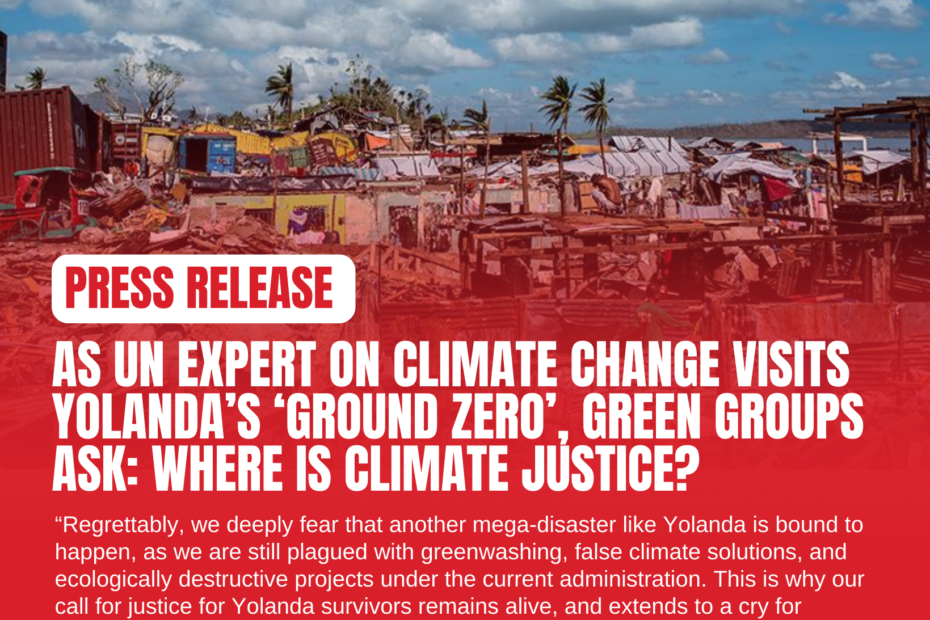Ian Fry, the United Nations Special Rapporteur on Climate Change and Human Rights, commenced his visit to Eastern Visayas, known as the ‘ground zero’ of Super Typhoon Yolanda, by engaging in a dialogue with affected residents, peoples’ organizations, and civil society groups in Tacloban City on November 10.
Eastern Visayas, which bore the brunt of the highest casualties, infrastructure damage, and economic impact from typhoons over the past decade, remain to be neglected in terms of government spending to prevent disasters. According to 2019-2021 COA report, the region witnessed a meager average government expenditure of Php265 per person for disaster risk reduction and aid during the last three years.
“It seems that even after experiencing a deadly typhoon, the Marcos administration and the provincial government have not learned their lesson and are focused only on recovering businesses and not the safety and upliftment of the standard of living of the citizens to help them fully recover from the Yolanda disaster and lower their climate vulnerabilities,” said Jon Bonifacio, National Coordinator of Kalikasan People’s Network for the Environment.
Eastern Visayas, like any other region in the Philippines, is already exposed to harsh climate conditions. It is particularly challenging for the region to deal with the loss and damage that is occurring from changes in the frequency, intensity, and geographical distribution of extreme weather events, such as storms and floods; and from slow-onset phenomena, such as sea-level rise, ocean acidification, loss of biodiversity, and desertification.
Rather than strengthening a comprehensive disaster risk reduction and mitigation plan, building social structures to foster adaptability, promoting inclusivity, and addressing the diverse needs of communities—essential for sustainable development and effective climate-related challenge mitigation—and empowering communities to combat the impacts of the climate crisis, the city government of Tacloban is focused on creating conditions that will further exacerbate the impacts of climate change.
“We are in the same storm but on different boats. Ten years after typhoon Yolanda, we observe that the poor sectors in the Eastern Visayas region have become poorer, with inflation at an all-time high. This is not justice. The affected population has never been able to fully recover because livelihood remains a major challenge,” said Ms. Jazmin Aguisanda-Jerusalem of Leyte Center for Development Inc.
The Tacloban City government is implementing a causeway project from Magsaysay Boulevard to the airport area in San Jose which will cut across the Cancabato Bay. This will essentially block the waterway of the bay and will be the start of other reclamation projects that will convert the bay into a central business district. It has already displaced hundreds of urban poor and fisherfolk families from coastal communities.
Aside from community displacement and loss of livelihood of fisherfolks dependent in the area, the mangrove reforestation in Brgy. Paraiso is threatened to be wiped out which locals worked hard to rebuild.
The call is to address the increasing injustice faced by the poor, now compounded by the impacts of climate change. It’s also crucial not to overshadow poverty amidst the intense focus on the global economic crisis, which is used by major polluters as justification to plunder more natural resources from developing countries such as the Philippines.
The crisis faced by the vulnerable communities in the country is fundamentally driven by the exploitation carried out by both corporations and the government. It represents a modern form of conquest, marked by the relentless depletion of remaining forests driven by insatiable greed. This greed victimizes the powerless, particularly the poor. As these corporations expand their investment portfolios, the disparity grows in parallel with the rising index of impoverished populations.
“Regrettably, we deeply fear that another mega-disaster like Yolanda is bound to happen, as we are still plagued with greenwashing, false climate solutions, and ecologically destructive projects under the current administration. This is why our call for justice for Yolanda survivors remains alive and extends to a cry for climate justice for the climate-vulnerable communities across the world,” said Bishop Jerby Salor, Chairperson of Eastern Visayas Regional Ecumenical Council. #
[This is a press release from Kalikasan PNE and is being shared here as part of our support for environmental advocacy and public information campaign on environmental news and issues]
Contact:
Jon Bonifacio
National Coordinator, Kalikasan PNE
secretariat@kalikasan.net / 0939 913 6943
Clemente Bautista Jr.
International Officer, Kalikasan PNE
Spokesperson, Philippine UPR Watch
enteng@kalikasan.net / 0917 137 2930

